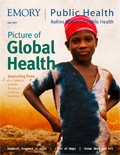Leaders in the Making
Foege Fellows live up to their namesake in shaping global health
By Patrick Adams
|
Picture of Global Health |
In 2003, when the William H. Foege Fellowship in Global Health program was still in the planning stages, RSPH professor and public health economist Deborah McFarland received a request from Foege and Dean James Curran. "They wanted to know if I would be the program director," she recalls. "I said 'yes' immediately."
In the six years since, McFarland has served as mentor, colleague, and friend to 14 Foege fellows, all supported by a $5 million endowment from the Bill & Melinda Gates Foundation. Established to honor the career achievements of Foege, renowned global health expert and senior adviser to the Gates Foundation, the gift supports four fellows every year. In pursing their MPH degrees, the fellows—mid-career professionals from developing countries—forge lasting partnerships with Atlanta-based public health agencies, including Emory, The Carter Center, CDC, CARE USA, and the Task Force for Global Health.
To date, 11 fellows have earned their MPH degrees, three currently are enrolled, and two new fellows arrived on campus this fall. "It's a tremendous opportunity for emerging global health leaders," says McFarland, who helps facilitate what can be a challenging transition. "A couple of fellows struggled at first with English. But the hardest thing for most of them is getting accustomed to being a student again after many years as a professional with a great deal of responsibility. They're an extraordinarily accomplished group of people."
Take, for example, Landry Tsague, a physician from Cameroon. Before he arrived at Rollins in August 2006, Tsague was coordinator of the National Prevention of Mother-to-Child Transmission (PMTCT) program for the Cameroonian Ministry of Public Health. Working directly with the Global Fund for AIDS, TB, and Malaria, Tsague was instrumental in scaling up PMTCT services throughout Cameroon. For his contributions, he received the International AIDS Society Young Investigator Award, among other distinctions.
His experiences as a Foege fellow were nothing short of life changing, he says. "Meeting and interacting with the people who have done so much to shape public health, who eradicated smallpox—it was humbling and inspiring, and it made me focus more on my work," Tsague says.
For his thesis on PMTCT in Kenya, Tsague collaborated with colleagues at the CDC's Global AIDS Program and CARE Cameroon, which nominated him for the Foege fellowship. "They helped me conceptualize public health problems," he says, "and gave me confidence in my ability to help solve those problems, which is what I do everyday."
In 2005, only 24 Guinea worm cases were reported in Burkina Faso, down from 1,995 in 2000, the year Dieudonné Sankara was appointed national coordinator of the country's Guinea Worm Eradication Program. So impressed was President Jimmy Carter that he summoned Sankara for a private meeting on the issue during his Foege fellowship in 2006. Sankara collaborated with The Carter Center to evaluate trachoma control programs in refugee camps in South Sudan, the research that formed the basis of his award-winning thesis. After graduating from the rsph in 2008, Sankara became the Neglected Tropical Diseases (NTD) technical director for the Research Triangle Institute in Washington, D.C. There he oversees integration of NTD programs in eight countries in sub-Saharan Africa.
Sankara's success was among the stories that McFarland proudly shared with Gates Foundation staff on a visit to the organization's Seattle headquarters earlier this year. McFarland made the trip with Foege fellows Madsen Beau de Rochars of Haiti, Joseph Njau of Tanzania, Gulnora Khasanova of Tajikistan, Muhsin Siddiquey of Bangladesh, and Sankara. "It was a fantastic opportunity for the fellows," she says. "No presentations, no speeches. Just a day-and-a-half of face-to-face exchange with Gates' senior health program staff, which is a rare thing."
The rewards were mutual, she adds. "The Gates staff don't engage in practice, so they're anxious to link with folks who are working in the field. It's a chance for them to channel these bright, capable, young researchers and ask, 'Is this intervention or this policy really working? Does it make sense?'"
Valuing the unvalued
McFarland's colleague, global health professor Stanley Foster, has learned a thing or two from the Foege fellows. He often cites the work of Senkham Boutdara.
"As director of CARE's country HIV/AIDS program in Laos, Senkham felt compassion for sex workers who were excluded from society," Foster recalls.
Boutdara broke through those barriers by visiting the sex workers' homes and listening to their stories. The ostracized women began to see themselves as persons of value. Boutdara arranged meetings between public officials and the newly empowered women. Their image began to change from that of "social evil" to "our sister who needs help," says Foster. "Senkham contributed much to our learning."
Patrick Adams is a 2009 graduate of the RSPH.


